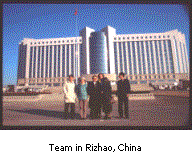
| CONCEPT | |||
|
A deliberate, global effort is needed to create concrete models of sustainable development, to complement various conventional initiatives underway. Rather than speculate about what might stimulate sustainable development, let us deliver it directly in 7-10 specific regions around the world, representing a broad spectrum of cultures and climates. The goal would be to provide a dignified standard of living while reducing the production of toxins, wastes, and the consumption of non-renewable resources, to less than 50% of OECD norms.
The effort will need the best expertise available in energy, waste, agriculture, transport, clean industrial production systems, etc. It will require practical economic-environmental systems modeling tools. It must foster an unprecedented partnership among citizens, government, the private sector, and technical experts, all of whom currently talk past each other. A balance of scale is needed; the regions must be large enough to take advantage of important resource flows affecting energy, agriculture, water, wastes, finance, and employment. Yet the regions must be small enough to remain manageable and accountable, to not threaten powerful national interests, and to build upon a feeling of regional identity, reflecting how most of us live. A region of between 200,000-several million people (a moderately large urban area and its resource hinterland) has enough physical, financial, and cultural resources to manage many sustainable development issues itself. |
 |
||
We need to push the limits of what can be done at the regional level, so that such efforts could largely replicate themselves, particularly in an era where politics and finance constrain the actions of most central governments.
This does not ignore the effects of national taxation policies, or changes in international terms of trade. We simply have to start somewhere to clarify these scale issues, to build some credibility, and to create public support for the larger policy changes if they are clearly seen as blocking progress. |
|||